News
Sustainability a growing focus for global pet food brands
6 Apr 2023
Pet food brands around the world are responding to consumer demands for sustainable pet food in many ways, from upcycled ingredients to carbon footprint claims and reduced-plastic packaging.
Increasingly aware of the environmental devastation caused by single-use plastic packaging, consumers are interested in products that are packaged in more sustainable and eco-friendly alternatives. This applies to both the food they buy for themselves and the petfood for their companions.

Ethical and environmental claims in the category have doubled in Europe in the past five years while 79% of Italian pet owners said they would like to know more about the eco footprint of different pet foods.
“Many consumers in Europe have become more knowledgeable of the ecological challenges that are facing the planet,” wrote Mintel innovation analyst Mikolaj Kaczorowski in the 2023 Mintel report, A Year of Innovation in Pet Food and Products. “[...] As a result, consumers are expecting brands to deliver meaningful ethical and environmental commitments and initiatives.
“Pet food brands in the region have stepped up efforts to address packaging waste by reducing material use and increasing recyclability," he added. "While carbon neutral claims remain niche in the category, brands are recognising growing consumer interest in the carbon footprint of the products they buy, and placing the information in a more prominent place on packaging.”
Such claims are more prevalent on wet and dry pet food products rather than snacks and treats, noted Mintel.
Carbon footprint labels and upcycled ingredients
One stand-out product launch is Edgard & Cooper’s complete adult cat food, which displays the carbon emissions on the front of the pack. Launched in the Netherlands, the product contains 50% fresh chicken meat sourced from free-range chickens and emits 2.2 kilos of CO2 per kilo of product.
Sustainable innovation in pet food is also happening at an ingredient level. In the US, the Portland Pet Food Company launched Bacon Brew biscuits dog treats that are made from upcycled brewer’s spent grain sourced from regional Northwest breweries.
“The intense competition in the pet food sector means that brands face an uphill battle to stand out and differentiate themselves. With the climate crisis increasingly on consumers' radars, brands can distinguish themselves from the competition by improving the climate footprint of their packaging,” Kaczorowski wrote.
Reduced-plastic and plastic-free packaging
Investing in sustainable pet food packaging could also resonate well in Latin America, according to the research firm. Sixty-two percent of adults in Colombia and Mexico say that environmentally friendly packaging is important to them when buying food and drink.
The number of pet food product launches in Latin America claiming to use environmentally friendly packaging rose modestly from 8% in 2018 to 14% in 2022, according to Mintel’s Global New Product Database.
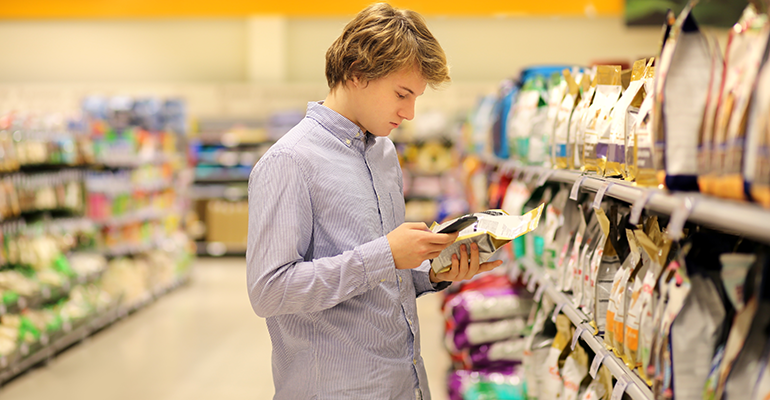 © AdobeStock/lado2016
© AdobeStock/lado2016
Brazilian brand Zee.dog, for example, launched a dog food product that is completely free from plastic packaging. Marketed as a complete meal for adult dogs, the chicken-based product is packaged in glass jars which are reusable and recyclable.
Panamanian brand Master Dog launched an indulgent snack for dogs – meat flavoured cookies – that come in a recyclable pack made with 25% less plastic.
Similar products are being launched in Asia. In Japan, Nestlé’s Purina repackaged Mon Petit Crispy Kiss chicken-based cat snack in a paper pack to reduce plastic waste, meaning the product now contains 66% less plastic than its previous iteration.
Don’t forget taste and nutrition
Just as with human food, however, consumers shopping for pet food prioritise taste and health over the efficacy of sustainable ingredients.
Mintel food and drink director, Kate Vlietstra noted in the recent 2023 Mintel report, The Future of Pet Food, that companies must also therefore reassure pet owners of the taste and health benefits of any pet food products that are marketed as sustainable, rather than focusing solely on the planet-friendly credentials.
Related news

Choose delicious and versatile US peanut ingredients
15 Oct 2025
The US supplies high quality, great tasting peanuts in a wide range of forms, from inshells or whole kernels, through to granulated peanuts, peanut butters, pastes, flours, oils and extract.
Read more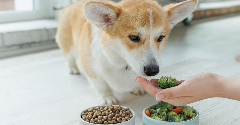
Pet food purchasers tap into plant-based potential
14 Oct 2025
Vegan diets provide dogs with similar levels of nutritional benefits to meat-based consumption, highlighting opportunities for diverse pet food development, research suggests.
Read more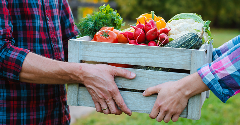
Could UK-EU agreement turn the tide for agri-food trade?
17 Jun 2025
The UK Government is to scrap border checks on fruit and vegetables imported from the European Union in an early move to ease trade ahead of its new deal with the bloc.
Read more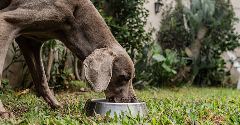
Mars looks to pet food as ‘inspiration’ for regenerative push
26 May 2025
Mars is leveraging pet owners' passion for nutrition to raise awareness of how regenerative approaches to farming can help restore soil health.
Read more
Dog food startup teams up with Harvard to accelerate AI-driven pet nutrition
19 May 2025
A premium dog food startup is teaming up with Harvard to enhance its artificial intelligence (AI) platform and accelerate pet nutrition product development.
Read more
Nestlé improves nutrition reporting as pressure grows on other food and beverage companies
16 May 2025
Nestlé has urged other major food manufacturing businesses to improve their reporting on the nutritional value of their products.
Read more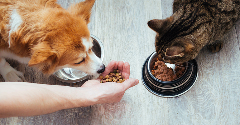
What are the latest global pet food trends?
16 Apr 2025
Pet owners want functional food that prioritises their pets’ health and wellbeing, according to research from market insights provider Innova.
Read more
UK consumers could be eating cultivated meat within two years
26 Mar 2025
Cell-cultivated products (CCPs), from chicken nuggets to beefburgers, could be on UK supermarket shelves by 2027 after regulators launched a sandbox to accelerate approvals.
Read more
Rapidly expanding pet ownership in Asia fuels demand for pet vitamins and science-backed nutrition
10 Dec 2024
Pet ownership rates have exploded across Asia in recent years. China is leading the way, with predominantly young, urban, female pet owners driving the latest pet food and supplements trends.
Read more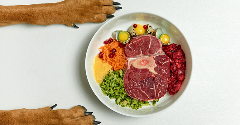
Rethinking pet nutrition: The rise of minimally processed fresh and raw pet food
7 Nov 2024
Concerns over ultra-processed foods (UPFs) and their long-term health effects could see consumers slowly move away from the traditionally dominant kibble.
Read more